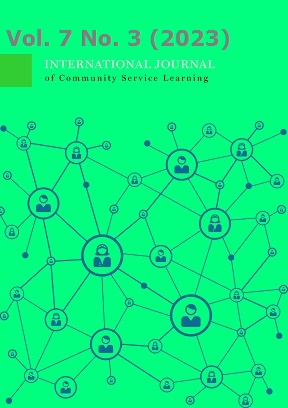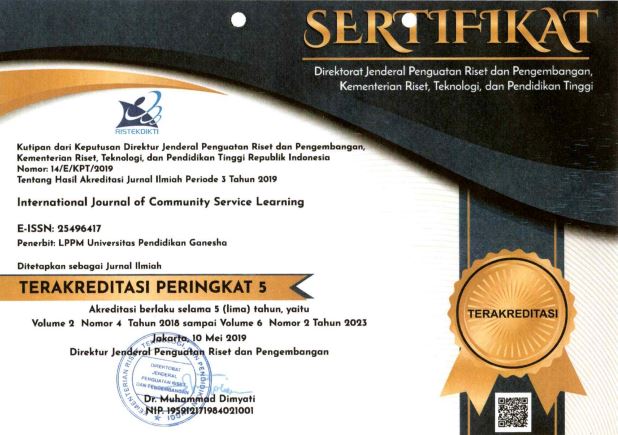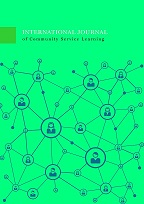An Early Exposure of Over-the-Counter Medicine Basic Knowledge among Elementary School Students
Over-the-Counter, knowledge, students
DOI:
https://doi.org/10.23887/ijcsl.v7i3.57752Keywords:
Elementary school studentsAbstract
Recently, self-medication using over-the-counter medicine (OTC) or non-prescription medicine became rapidly popular. Enhancing society's awareness of OTC knowledge and its rational use is greatly significant to promote public health both in adults and children. In the US, a high number of young children are brought to the emergency room due to accidental unsupervised medication each year. Therefore, learning how to self-medicate using OTC at an early age is very critical to improve medication safety in society. This study aims to trained elementary school grades V and IV at the age of 10 to 12 to perceive the basic knowledge of OTC and how to take them safely. This study conducted outreach to students in grades V and VI starting with a pre-test, education dan training, followed by a question-and-answer session, and closed with a post-test. After education and training, the knowledge of the OTC among the students increased, especially significantly in Grade V indicated by post-test score elevating. Thus, this attempt may contribute to increasing the awareness of self-medication using OTC among children.
References
Abdullah, I. S., Chaw, L. L., Koh, D., Hussain, Z., Goh, K. W., Hamid, A. A. A., & Ming, L. C. (2022). Over-the-Counter Medicine Attitudes and Knowledge among University and College Students in Brunei Darussalam: Findings from the First National Survey. International Journal of Environmental Research and Public Health, 19(5). https://doi.org/10.3390/ijerph19052658. DOI: https://doi.org/10.3390/ijerph19052658
Abel, C., Johnson, K., Waller, D., Abdalla, M., & Goldsmith, C. A. W. (2012). Nonprescription medication use and literacy among New Hampshire eighth graders. Journal of the American Pharmacists Association, 52(6), 777–782. https://doi.org/10.1331/JAPhA.2012.11158. DOI: https://doi.org/10.1331/JAPhA.2012.11158
Abraham, O., & Chmielinski, J. (2018). Adolescents’ Misuse of Over-The-Counter Medications: The Need for Pharmacist-led Intervention. INNOVATIONS in Pharmacy, 9(3), 4. https://doi.org/10.24926/iip.v9i3.979. DOI: https://doi.org/10.24926/iip.v9i3.979
Abraham, O., Feathers, A., Mook, H., & Korenoski, A. (2019). The perceived benefits of student pharmacists educating children about over-the-counter medication safety. Currents in Pharmacy Teaching and Learning, 11(2), 184–191. https://doi.org/10.1016/j.cptl.2018.11.005. DOI: https://doi.org/10.1016/j.cptl.2018.11.005
Afshary, P., Mohammadi, S., Najar, S., Pajohideh, Z., & Tabesh, H. (2015). Prevalence and Causes of Self-Medication in Pregnant Women Referring To Health Centers in Southern of Iran. International Journal of Pharmaceutical Sciences and Research, 6(2), 612. https://doi.org/10.13040/IJPSR.0975-8232.6(2).612-19. DOI: https://doi.org/10.13040/IJPSR.0975-8232.6(2).612-19
Al-Qahtani, M. F. (2013). Relationship between English Language, Learning Strategies, Attitudes, Motivation, and Students’ Academic Achievement. Education in Medicine Journal, 5(3), 19–30. https://doi.org/10.5959/eimj.v5i3.124. DOI: https://doi.org/10.5959/eimj.v5i3.124
ALBashtawy, M., Batiha, A. M., Tawalbeh, L., Tubaishat, A., & AlAzzam, M. (2015). Self-Medication Among School Students. Journal of School Nursing, 31(2), 110–116. https://doi.org/10.1177/1059840514554837. DOI: https://doi.org/10.1177/1059840514554837
Asokan, A. G., Varghese, V. A., & Rajeev, A. (2019). Internet addiction among medical students and its impact on academic performance: an Indian study. Journal of Medicine of Science Clinical Research, 7, 670–676. https://doi.org/10.18535/jmscr/v7i3.122. DOI: https://doi.org/10.18535/jmscr/v7i3.122
Ayalew, M. B. (2017). Self-medication practice in Ethiopia: A systematic review. Patient Preference and Adherence, 11, 401–413. https://doi.org/10.2147/PPA.S131496. DOI: https://doi.org/10.2147/PPA.S131496
Boshhiha, A. M., Boshaiha, Z. M., Yousuf, A. T., & Sad, H. A. (2021). Use of over the counter medications among adolescents. J Pharm Pharm Sci, 1(4), 9–14. https://doi.org/10.5281/zenodo.5805918.
Chautrakarn, S., Khumros, W., & Phutrakool, P. (2021). Self-Medication With Over-the-counter Medicines Among the Working Age Population in Metropolitan Areas of Thailand. Frontiers in Pharmacology, 12(August), 1–9. https://doi.org/10.3389/fphar.2021.726643. DOI: https://doi.org/10.3389/fphar.2021.726643
Chowdhury, S., & Chakraborty, P. prati. (2017). Universal health coverage ‐ There is more to it than meets the eye. Journal of Family Medicine and Primary Care, 6(2), 169–170. https://doi.org/10.4103/jfmpc.jfmpc. DOI: https://doi.org/10.4103/jfmpc.jfmpc_13_17
Fekadu, G., Dugassa, D., Negera, G. Z., Woyessa, T. B., Turi, E., Tolossa, T., Fetensa, G., Assefa, L., Getachew, M., & Shibiru, T. (2020). Self-medication practices and associated factors among health-care professionals in selected hospitals of western ethiopia. Patient Preference and Adherence, 14, 353–361. https://doi.org/10.2147/PPA.S244163. DOI: https://doi.org/10.2147/PPA.S244163
Hailemichael, W., Sisay, M., & Mengistu, G. (2016). Assessment of Knowledge, Attitude, and Practice of Self-Medication Among Harar Health Sciences College Students, Harar, Eastern Ethiopia. Journal of Drug Delivery and Therapeutics, 6(5). https://doi.org/10.22270/jddt.v6i5.1329. DOI: https://doi.org/10.22270/jddt.v6i5.1329
Hughes, C. M., Mcelnay, J. C., & Fleming, G. F. (2001). Benefits and Risks of Self Medication. Drug Safety, 24(14). https://doi.org/10.2165/00002018-200124140-00002. DOI: https://doi.org/10.2165/00002018-200124140-00002
Jember, E., Feleke, A., Debie, A., & Asrade, G. (2019). Self-medication practices and associated factors among households at Gondar town, Northwest Ethiopia: a cross-sectional study. BMC Research Notes, 12(1). https://doi.org/10.1186/s13104-019-4195-2. DOI: https://doi.org/10.1186/s13104-019-4195-2
Lee, C. H., Chang, F. C., Hsu, S. de., Chi, H. Y., Huang, L. J., & Yeh, M. K. (2017). Inappropriate self-medication among adolescents and its association with lower medication literacy and substance use. PLoS ONE, 12(12). https://doi.org/10.1371/journal.pone.0189199. DOI: https://doi.org/10.1371/journal.pone.0189199
Lei, X., Jiang, H., Liu, C., Ferrier, A., & Mugavin, J. (2018). Self-medication practice and associated factors among residents in Wuhan, China. International Journal of Environmental Research and Public Health, 15(1). https://doi.org/10.3390/ijerph15010068. DOI: https://doi.org/10.3390/ijerph15010068
Mathias, E. G., D’Souza, A., & Prabhu, S. (2020). Self-Medication Practices among the Adolescent Population of South Karnataka, India. Journal of Environmental and Public Health. https://doi.org/10.1155/2020/9021819. DOI: https://doi.org/10.1155/2020/9021819
Matson, K. L., Orr, K. K., Marino, C., & Cohen, L. (2019). The Effect of a Student Pharmacist Directed Health-Education Program for Elementary-School Children. Innovations in Pharmacy, 10(4), 6. https://doi.org/10.24926/iip.v10i4.1457. DOI: https://doi.org/10.24926/iip.v10i4.1457
Mohammed, S. A., Tsega, G., & Hailu, A. D. (2021). Self-medication practice and associated factors among health care professionals at debre markos comprehensive specialized hospital, Northwest Ethiopia. Drug, Healthcare and Patient Safety, 13, 19–28. https://doi.org/10.2147/DHPS.S290662. DOI: https://doi.org/10.2147/DHPS.S290662
Noone, J., & Blanchette, C. M. (2018). The value of self-medication: summary of existing evidence. Journal of Medical Economics, 21(2), 201–211. https://doi.org/10.1080/13696998.2017.1390473. DOI: https://doi.org/10.1080/13696998.2017.1390473
Ouyang, F., & Scharber, C. (2017). The influences of an experienced instructor’s discussion design and facilitation on an online learning community development: A social network analysis study. Internet High. Educ., 35, 34–47. https://doi.org/10.1016/j.iheduc.2017.07.002. DOI: https://doi.org/10.1016/j.iheduc.2017.07.002
Parulekar, M., Mekoth, N., Ramesh, C., & Parulekar, A. (2016). Self-medication in Developing Countries a Systematic Review. Journal of Pharmaceutical Technology, Research and Management, 4(2), 103–127. https://doi.org/10.15415/jptrm.2016.42007. DOI: https://doi.org/10.15415/jptrm.2016.42007
Rehman, M., Ahmed, S., Ahmed, U., Tamanna, K., Shehryar Sabir, M., & Niaz, Z. (2021). An overview of self-medication: A major cause of antibiotic resistance and a threat to global public health. Journal of the Pakistan Medical, 71(3), 943–949. https://doi.org/10.47391/JPMA.1331. DOI: https://doi.org/10.47391/JPMA.1331
Savitri, A. R. E., Rahman, A., & Hermawan, Y. (2022). Pengaruh Kecemasan dan Motivasi Belajar dalam Pembelejaran Daring di Masa Pandemi Covid-19 Terhadap Hasil Belajar Sosiologi Siswa Kelas XII SMA Batik 1 Surakarta. JISIP (Jurnal Ilmu Sosial Dan Pendidikan), 6(1), 2148–2155. https://doi.org/10.58258/jisip.v6i1.2569. DOI: https://doi.org/10.58258/jisip.v6i1.2569
Senok, A., John-Baptiste, A.-M., Al Heialy, S., Naidoo, N., Otaki, F., & Davis, D. (2022). Leveraging the Added Value of Experiential Co-Curricular Programs to Humanize Medical Education. Journal of Experiential Education, 45(2), 172–190. https://doi.org/10.1177/10538259211021444. DOI: https://doi.org/10.1177/10538259211021444
Shafie, M., Eyasu, M., Muzeyin, K., Worku, Y., & Martín-Aragón, S. (2018). Prevalence and determinants of selfmedication practice among selected households in Addis Ababa community. PLoS ONE, 13(3), 1–20. https://doi.org/10.1371/journal.pone.0194122. DOI: https://doi.org/10.1371/journal.pone.0194122
Suarez-Lledo, V., & Alvarez-Galvez, J. (2021). Prevalence of health misinformation on social media: Systematic review. Journal of Medical Internet Research, 23(1). https://doi.org/10.2196/17187. DOI: https://doi.org/10.2196/17187
Sürmelioğlu, N., Kıroğlu, O., T., E., & Y, K. (2015). Measures for Prevention of Irrational Drug Use. Archives Medical Review Journal, 24(4), 452–462. https://doi.org/10.17827/aktd.64527. DOI: https://doi.org/10.17827/aktd.64527
Swire-Thompson, B., & Lazer, D. (2019). Public health and online misinformation: Challenges and recommendations. Annual Review of Public Health, 41, 433–451. https://doi.org/10.1146/annurev-publhealth-040119-094127. DOI: https://doi.org/10.1146/annurev-publhealth-040119-094127
Syofyan, S., Dachriyanus, D., Masrul, M., & Rasyid, R. (2019). The knowledge and attitudes about the benefits, risks and use of medicine in aged primary students in Indonesia. Open Access Macedonian Journal of Medical Sciences, 7(11), 1860–1866. https://doi.org/10.3889/oamjms.2019.347. DOI: https://doi.org/10.3889/oamjms.2019.347
Wagner, J. L., Guilfoyle, S. M., Rausch, J., & Modi, A. C. (2015). Psychometric validation of the Pediatric Symptom Checklist-17 in a pediatric population with epilepsy: A methods study. Epilepsy & Behavior, 51, 112–116. https://doi.org/10.1016/j.yebeh.2015.06.027. DOI: https://doi.org/10.1016/j.yebeh.2015.06.027
Yin, C., He, X., Shen, K., Mu, X., & Tang, F. (2022). Knowledge and Behavior in Rational Drug Use Among College Students in Zunyi City. Risk Management and Healthcare Policy, 15, 121–131. https://doi.org/10.2147/RMHP.S347822. DOI: https://doi.org/10.2147/RMHP.S347822
Yusransyah, Y., Stiani, S. N., & Zahroh, S. L. (2021). Pengabdian Masyarakat Tentang Dagusibu (Dapatkan, Gunakan, Simpan Dan Buang) Obat Dengan Benar di SMK LPKI Labuan Pandeglang. Jurnal Abdi Masyarakat Kita, 1(1), 22–31. https://doi.org/10.33759/asta.v1i1.95. DOI: https://doi.org/10.33759/asta.v1i1.95
Downloads
Published
How to Cite
Issue
Section
License
Copyright (c) 2023 Fizkha Hanindita, Nyoman Bayu Wisnu, Erika Setyajati, Agustina Setiawati

This work is licensed under a Creative Commons Attribution-ShareAlike 4.0 International License.

International Journal of Comunnity Service Learning is licensed under a Creative Commons Attribution-ShareAlike 4.0 International License.













